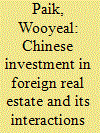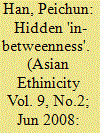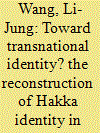|
|
|
Sort Order |
|
|
|
Items / Page
|
|
|
|
|
|
|
| Srl | Item |
| 1 |
ID:
163467


|
|
|
|
|
| Summary/Abstract |
Since the early 2000s, a great tide of Chinese "go outside" (zouchuqu), or outbound foreign investment, has happened in many regions and industries of the world. Among these, real estate has emerged as one of the most rapidly increasing outbound investments from China in the 2010s. As a result, Chinese investors, both enterprises and individuals, have had an extensive and growing impact on host states and societies, which are largely developed and democratic. This study analyzes the multifaceted interactions between Chinese foreign real-estate investors and host states and societies using the case of Jeju Province in South Korea from 2010 to 2018. More specifically, it analyzes the responses of the host country's national and local governments, as well as its grassroots civil society, to the soaring and often unconstrained Chinese investment in its real estate, focusing on the role of a host country's democratic institutions.
|
|
|
|
|
|
|
|
|
|
|
|
|
|
|
|
| 2 |
ID:
161178


|
|
|
| 3 |
ID:
082444


|
|
|
|
|
| Publication |
2008.
|
| Summary/Abstract |
This article offers an analysis of the dynamic interplay of ogenous and exogenous forces that create the complexity of immigrant entity. It examines cultural identity and the related discourse of one particular immigrant group, the 'post-war immigrant aiwanese, in contemporary Japan. This group came to Japan after the end of Second World War. They have experienced complex transitions in both legal status and self-identification. Constituted from the legacies of Japanese colonialism and Chinese aonalism,he post-warmigr Taiwanese constantly negotiate and redefine their 'neither here, nor there' identities and thus constitute a distinct case within the population of overseas ethnic Chinese. Japan, widely considered to be a society of racial and cultural homogeneity, faces an increasing influx of migrants, in particular those from East Asia in recent years. Immigration thus leads to a broad range of concerns in contemporary Japanese society. While previous literatures of the Chinese and Korean Diaspora are widely researched, there is a vacuum on Taiwanese Diaspora in the associated scholarship. This study investigates the Taiwanese migrants' cultural adaptation and socialization under the Japanese discourse through literature reviews and field study. This paper argues that the post-war migr Taiwanese have constructed a transnational identity hidden in-between two cultures of Japanese and Chinese. In other words, this paper attempts to offer a perspective of Taiwanese under Japanese colonialism and Chinese nationalism that transcends the 'identity struggle' commonly experienced by immigrants around the world. This group of Taiwanese migrants in postwar Japan struggle with surveillance, assimilation, resistance and identity confusion. To balance between a survival strategy overseas and a primordial attachment to the motherland, their identification with group boundaries may shift in accordance with a variety of situations.
|
|
|
|
|
|
|
|
|
|
|
|
|
|
|
|
| 4 |
ID:
153640


|
|
|
|
|
| Summary/Abstract |
China’s relations with communities of Chinese overseas and its attempts to improve these relations are challenged by the weakening ties between younger generations of Chinese overseas and China. This article examines Chinese government-sponsored camps which were developed to counteract the estrangement of Chinese overseas youth through exposure to Chinese culture, language, history and society. Drawing on a historical account of the programme and fieldwork performed among Chinese-Filipino youth in Xiamen, it argues that China’s youth camps programme is more than a top–down, transnational initiative aimed at influencing the ethnic and cultural identities of these youths. Instead, these camps embody a convergence of national, institutional and personal agendas (e.g. the long-standing Beijing–Taipei rivalry, the self-defined agendas of Chinese overseas, and local officials’ desires to garner political credit from upper-level authorities). This study also argues that the programme has made substantial contributions to Chinese language learning and to a relatively positive image of China among Chinese-Filipino participants and that its influence on the cultural and ethnic orientations of Chinese-Filipino youth has been stronger than its impact on their political identity.
|
|
|
|
|
|
|
|
|
|
|
|
|
|
|
|
| 5 |
ID:
153223


|
|
|
|
|
| Summary/Abstract |
Although the Chinese in Kolkata have preserved their Chinese identity, they have been acculturated by various cultural elements from India. It is this mixture of Chinese and Indian practices that gives them a unique cultural identity. When members of this Chinese community in Kolkata and its vicinity emigrated to Toronto or were forcibly deported to China in the aftermath of the 1962 conflict, they carried with them, both knowingly and unknowingly, some of these Chinese-Indian cultural traits. By focusing on the Chinese-Indians living in different geographical and cultural settings, this essay examines the formation of a Chinese-Indian identity in Kolkata and its preservation by some of those who are now residing in Sihui in China and in Toronto, Canada. It also explains some of the main similarities and differences among the three groups of Chinese-Indians. It concludes with an analysis of cultural identity as it manifests among the Chinese-Indian communities.
|
|
|
|
|
|
|
|
|
|
|
|
|
|
|
|
| 6 |
ID:
157956


|
|
|
|
|
| Summary/Abstract |
The Hakka people (Hakkas) are a global cultural ethnic group. This article explored the experiences of the Hakkas in Thailand. One major ethnic minority in Thailand is the Chinese people (14 percent of the total population) who engage in businesses and commerce throughout the country. Fifty-six percent of the Chinese are Chaozhounese, and 16 percent are Hakkas. This article argued that the Thai-Hakka identity is a transnational construction mobilized by multiple agencies at the local, national, and global levels. This identity is a result of the negotiation from the common motherland (China) in the past, the new modern Hakka discourse and the multicultural policy (Taiwan), and the complex ethnic experiences and interactions in everyday life (Thailand). Compared to the traditional diaspora viewpoint (pluri-locally distributed, with a strong identity to the motherland), the Thai-Hakka identity has gravitated towards a new path of transnational identity (pluri-locally distributed, without a clear centre–periphery relation).
|
|
|
|
|
|
|
|
|
|
|
|
|
|
|
|
|
|
|
|
|